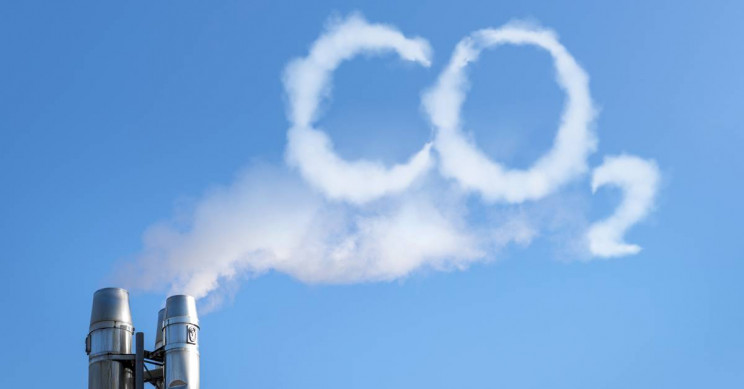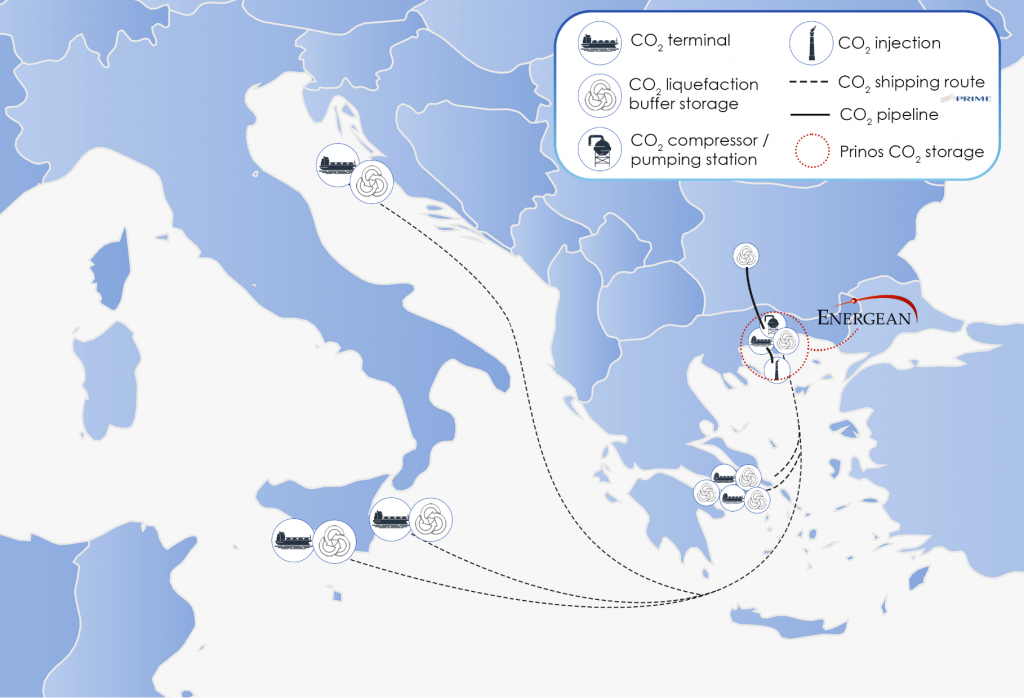
Greece’s first carbon capture, utilization and storage (CCUS) project, to be conducted by the National Natural Gas System (DESFA) and Energean, expects to conclude important regulatory and financial issues within 2024 and hopes to enter its first phase of operations in 2025.
The project by the two companies, known as Prinos CO2 Storage, is currently the only project in the eastern Mediterranean region that has an exploration permit. It is now aiming to obtain a storage permit by the end of the second quarter of 2024 and a license to operate by the end of 2025.
Prinos’ budget is estimated at over 1.5 billion euros, 900 million of which will be undertaken by Energean and 600 million by DESFA. Energean will construct CO2 storage that is expected to be able to accommodate 2.5 to 3 million tons of CO2 per year once it is in full operation.
The project is divided into two phases, with phase one aiming for a storage capacity of 1 million tons per year by the end of 2025 and phase two reaching full capacity by the end of 2027.
According to the project’s website, it is considered a European Project of Common Interest (PCIs) and the Greek government has committed 150 million euros in funding under the European Recovery and Resilience Facility (RRF).
The areas planned for carbon storage are located in the vicinity of Kavala, in northeast Greece, and the area was selected because its geological characteristics are expected to be ideal, according to Energean.

The company adds on its website that, “this project aligns with and is an integral part of the Mediterranean CCS Strategic Plan developed by France, Italy, and Greece, aiming to create the first industrial/commercial-scale CO2 storage hub in the Southeast Mediterranean.”
Connected to the project, DESFA has secured 75 million euros to create a network of CO2 transport pipelines, called the “Apollo CO2” project. CO2 will initially be captured in gaseous form, from cement factories and refineries, and then be liquified in the Revithoussa LNG terminal located on the islet of the Gulf of Megara.
The liquified CO2 will be loaded onto ships and taken to Prinos and eventually to any other CCUS projects that are developed.
Final decisions about the level of investment in the CCUS project are expected in 2025 and are heavily dependent upon the level of funding that will be obtained.
The idea of carbon capture has been around since 1938 and was first implemented in 1972 in Texas USA. The first integrated CCUS project was called the Sleipner project, by Norway, in the north sea.
CCUS involves capturing CO2 emissions at source, from industrial processes like steel, cement and the burning of fossil fuels. The carbon is turned into liquid form and transported, by ship or pipeline, and stored deep underground in geological formations.
Source: tovima.com
Latest News

Airbnb: Greece’s Short-Term Rentals Dip in March Amid Easter Shift
Data from analytics firm AirDNA shows that average occupancy for short-term rentals dropped to 45% in March, down from 49% the same month last year.

Easter Week in Greece: Holy Friday in Orthodoxy Today
At the Vespers service on Friday evening the image of Christ is removed from the Cross and wrapped in a white cloth

Meloni and Trump Meet in Washington, Vow to Strengthen Western Ties
“I am 100% sure there will be no problems reaching a deal on tariffs with the EU—none whatsoever,” Trump stressed.

ECB Cuts Interest Rates by 25 Basis Points in Expected Move
The ECB’s Governing Council opted to lower the deposit facility rate—the benchmark for signaling monetary policy direction—citing an updated assessment of inflation prospects, the dynamics of underlying inflation, and the strength of monetary policy transmission.

Current Account Deficit Fell by €573.2ml Feb. 2025: BoG
The improvement of Greece’s current account was mainly attributed to a more robust balance of goods and, to a lesser extent, an improved primary income account

Hellenic Food Authority Issues Food Safety Tips for Easter
Food safety tips on how to make sure your lamb has been properly inspected and your eggs stay fresh.

Greek Kiwifruit Exports Smash 200,000-Ton Mark, Setting New Record
According to data by the Association of Greek Fruit, Vegetable and Juice Exporters, Incofruit Hellas, between September 1, 2024, and April 17, 2025, kiwifruit exports increased by 14.2%.

Easter Tourism Boom: Greece Sees 18.3% Surge in Hotel Bookings
Among foreign markets, Israel has emerged as the biggest growth driver, with hotel bookings more than doubling—up 178.5% year-on-year.

Greece to Launch Fast-Track Tender for Offshore Hydrocarbon Exploration
Last week, Papastavrou signed the acceptance of interest for the two Cretan blocks, while similar decisions regarding the two Ionian Sea blocks were signed by his predecessor

American-Hellenic Chamber of Commerce to Open Washington D.C. Branch
AmCham's new office aims aims to deepen U.S.-Greece economic ties and promote investment and innovation between the two countries







![Πλημμύρες: Σημειώθηκαν σε επίπεδα ρεκόρ στην Ευρώπη το 2024 [γράφημα]](https://www.ot.gr/wp-content/uploads/2025/04/FLOOD_HUNGRY-90x90.jpg)




![Airbnb: Πτωτικά κινήθηκε η ζήτηση τον Μάρτιο – Τι δείχνουν τα στοιχεία [γράφημα]](https://www.ot.gr/wp-content/uploads/2024/07/airbnb-gba8e58468_1280-1-90x90.jpg)












![ΙΟΒΕ: Πώς το δημογραφικό υπονομεύει την ανάπτυξη – Τι συμβαίνει στις ελληνικές περιφέρειες [γραφήματα]](https://www.ot.gr/wp-content/uploads/2025/04/dimografiko-600x375.jpg)












![Airbnb: Πτωτικά κινήθηκε η ζήτηση τον Μάρτιο – Τι δείχνουν τα στοιχεία [γράφημα]](https://www.ot.gr/wp-content/uploads/2024/07/airbnb-gba8e58468_1280-1-600x500.jpg)


 Αριθμός Πιστοποίησης
Αριθμός Πιστοποίησης